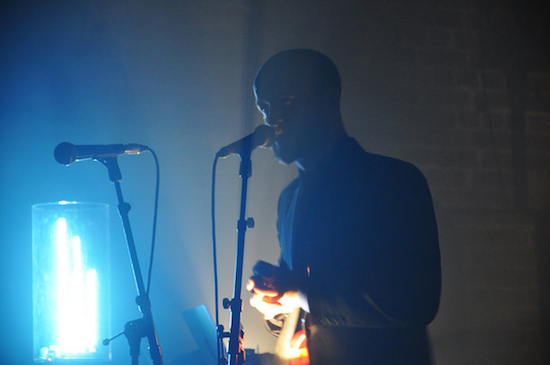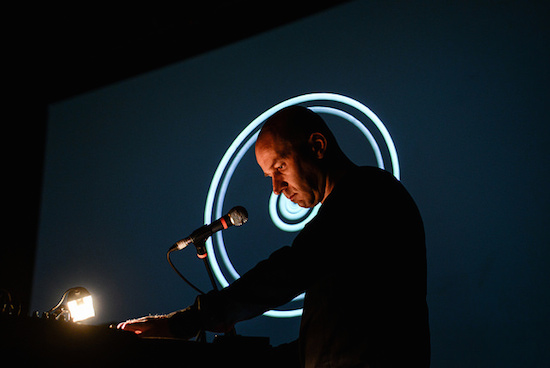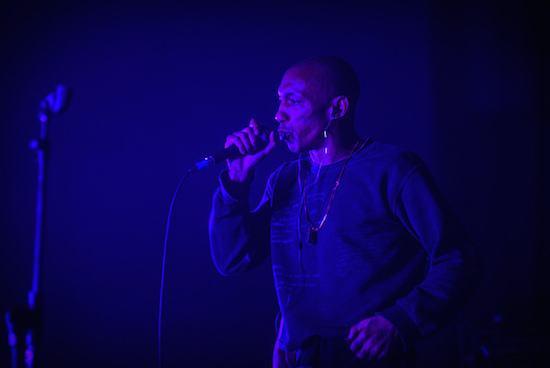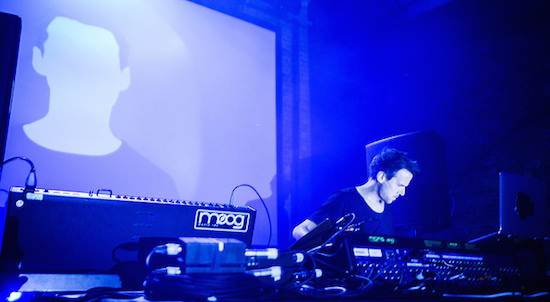Photo by Antonia Pagano
Clark/Vessels
You could just give everyone at the Convergence opener a hug. It’s a Thursday and it’s Shoreditch and it’s so lovely not to have to waste all your energy on despising everyone in the room. Clark and Vessels fans combine to form a nice, diverse crowd that enjoy a bit of a mid-week rave but apologise if they smash you in the kidney.
Vessels look like five men competing in an Edward Snowden look-a-like contest. Their move away from a purer post-rock sound proves popular, despite their sampled vocals getting stuck between their instruments. The highlights are undoubtedly their covers of Modeselektor’s ‘Blue Clouds’ and Nathan Fake’s ‘The Sky Was Pink’ (the James Holden remix, specifically), which is a shame because it suggests their own material wasn’t strong. It was, and Dilate is a good record, but perhaps their taste slightly outpaces their output.
Clark starts by showing the video for his new single ‘To Live And Die In Grantham’ – which is shot beautifully but is ultimately a whisker too close to working-class porn, something that techno producers need to get the fuck over already. The set itself is strong, skimming the cream off the top of an industrial soundworld and shaking it about until a kind of smooth, IDM goat’s cheese is formed. It’s cold though – Clark is personally the wearer of an exclusively sour bake and his music, especially that from his most recent, self-titled album, feels sharp, like he’s gigging on a Kazakh nuclear wasteland. Still, for all its iciness there’s a willingness to experiment as he plucks sounds from seemingly any facet or era of electronic music – a Flame Rave it certainly is. Suzie McCracken
Gary Numan
Tonight, a (determinedly unseated) Numanoid army has turned this genteel venue into a sea of air-punching, black-clad uniformity, in thrall to a leader who’s making like a gym-trained messiah under laser lights. But if the awkward performer of Top Of The Pops celebrity is long gone, then so too is his epoch-defining, chilly electronic minimalism; it’s gradually been replaced by a hefty, industrio-goth-metal hybrid, now being cranked out at serious volume.
With its sturm und drang maximalism echoing Killing Joke, NIN and Laibach, and the chants of "Numa-hun" that erupt whenever there’s a pause in proceedings, this feels as much like a rally as a gig. And although it’s easy to understand why Gary Numan has felt the need to effect complete makeovers of his hits, it’s hard not to be disappointed by the fact that the thin, whining synth so central to ‘Cars’ is being pulverised by thunderous drums and clenched-buttock guitar riffs, or that ‘Down In The Park’ now pivots on a lingerie-rock motif played by a prancing ninny.
Still, set closer ‘Are "Friends" Electric’ is a satisfyingly fulsome rendition, the see-sawing synth refrain as familiar to devotees as the backs of their own hands, and ‘We’re The Unforgiven’ (from latest album Splinter) sounds colossal, its Metallica overtones prompting Numan to adopt a crucifixion pose – not for the first time. He’s an odd choice of saviour, maybe, but given his history and bequest, it’s hard to begrudge the man his career resurrection. Sharon O’Connell

Photo by Dan Davies
Herbert
Mercifully, there’s no sign of a dead pig. Nor the aftermath of a deadly explosion. In fact, just one tune into this set, ringmaster (Matthew) Herbert halts proceedings to introduce tiny clips from the records in his vast catalogue that he and his eight-strong ensemble won’t be visiting tonight. And they very much include the controversial One Pig and devastating The End Of Silence.
He’s here to preview The Shakes, Herbert’s first dance record in nine years. The palpable buzz in this room for the unfamiliar is a measure of how much admiration and respect the man inspires, and although there are diversions into the avant garde – notably via ‘Safety’, where the players don black hoods and the rich, soulful voice of Ade Omotayo warns of "the horror in the sky", over a Scott Walker-ish discordance of electronic blurts and chattering wood blocks – it’s all about feel-good house, both old and new.
The set opens with new track ‘Battle’, which builds from a warm, amniotic throb to horns-splashed euphoria, then shifts pace after the playful quasi gospel of last year’s ‘One Two Three’ (featuring the righteous Rahel Debebe-Dessalegne), until really hitting its stride on the Afro-funk/techno hybrid cum 10-hand clap-athon that is ‘Strong’. There’s also a gorgeous plunge into darkly spangled, oceanic house (‘Silence’) and an ebullient encore in ‘Peak’, which suggests Liza Minnelli gone AWOL at Rio carnival.
Of course, no decent sonic provocateur would leave his audience uninvolved and so it is that our chest thumps, timid whistling and unified yells are recorded early on, to be looped and played back to us as a groovy tune component at the set’s close. "Fantastic!" we all bellow, on Herbert’s command. And it kind of is. Sharon O’Connell

Photo by Antonio Pagano
Radioland
There comes a point when one is suddenly reminded of Disaster Area, the plutonium rock band who, according to Douglas Adams in Hitchhiker’s Guide To The Galaxy, is widely regarded as the loudest band in the universe. It arrives at the moment when drainpipe jeans actually start flapping against the sonic onslaught and hair begins to part. It’s hard not to feel sorry for the members of the audience who move well away from the front of the stage, some fleeing the venue in obvious distress and one suspects that even listening to Radioland from the safety of a concrete bunker 37 miles away still wouldn’t constitute anything resembling comfort.
According to the publicity blurb, tonight’s show is a "… reworking of [Kraftwerk’s Radioactivity] from the ground up, staying closely to the essence of the original titles and using these as a platform from which to explore other sonic possibilities." It’s a deliberately nebulous claim given that Radioland – Matthew Bourne (analogue synths), Franck Vigroux (electronics) and Antoine Schmitt (visuals) – stray far from the album’s concepts of communication and the dangers of nuclear power to create a fearsome noise accompanied by discombobulating visuals that’s akin to digital shouting. With a just a few nods to the source material, this is an experience that sadly goes beyond the visceral and into the overwhelming. A missed opportunity, then, that’s marked by a failure to comprehend the intent of the original album and too much self-indulgence. Julian Marszalek
Gazelle Twin
I’m envious of anyone in the initially slight crowd at St John’s who’s encountering Elizabeth Bernholz for the first time. It’s exhilarating to watch her crawl viscerally under the skin of new audiences, particularly when the banshee wail of opening track ‘Unflesh’ summons everyone to chilling attention. From here its hypnotic beat – somewhere between a heartbeat and a dry heave – hammers home everything that is brilliant about Gazelle Twin, not least the arresting visual. At one point during the track, Bernholz bobs rhythmically, head down, a tumble of nylon brunette tresses hanging from her cobalt hood – like the tentacles of some nightmarish sea creature.
But despite this, the set has a different intensity in the high-ceilinged chapel; less dark, more curious and ethereal. The more spacious tracks from her 2014 album are foregrounded, ‘Premonition’ and ‘Good Death’ carrying an angelic voice over the crowd, swirling in an electronic morass. I could personally have done with a lot more volume and bass, but perhaps that inadvertently offers some light and shade. When a more intense darkness drops, on the brilliant ‘Anti Body’ and ‘Belly Of The Beast’ with its scuttling beat – like claws under silent seas – you can feel the room swell toward her and the incantation of the lyrics. She breathes in time, sucking in souls left and right. Amy Pettifer

Photo by Antonio Pagano
Tricky
There’s palpable excitement about Tricky’s performance, tinged with nostalgia for both Maxinquaye – now 20 years old and one of the most beguiling records of the early 90s – and the fact that he has remained a fascinating artist; restless and mysterious as he negotiates his own particular dark matters.
But in a live setting – from which he’s been latterly absent – this recorded gold along with such restlessness is a dangerous chemical mix. His innate discomfort and shunning of an iconic star persona, means that his band has to work triple hard to keep things together as he paces the stage, directing play with a pointed finger and furtive whispers.
The set covers songs from Blowback, False Idols and Knowle West Boy, but mostly as fragmented instrumentals. A raggedy knockabout version of ‘Palestine Girl’ brings Tricky himself to the mike for the first time, 9 songs in. Rather than being dominated by crepuscular beats, the prevailing sound is best described as an extrapolation of the driving guitar riff from ‘Black Steel.’ Tonight he is most interested in expressing the rockier side of his sonic personality, which stretches to include covers of The Breeders’ ‘Do You Love Me Now?’ and The Stooges’ ‘I Wanna Be Your Dog’. Amazing picks for covers, yes. But with the man himself mainly opting out, it’s hard for them to be to be more than what they are, i.e. covers played by an anonymous – albeit tight – indie rock band.
Tricky’s female vocalists remain as vital and anchoring as ever, and Francesca Belmonte is capable of switching convincingly between the set’s rockier and more creeping, soulful moments. But as good as she is, negotiating the long, iconic vocal shadows of ‘Overcome’ and ‘Black Steel’ is no easy gig. The best moment by far is when Tricky brings out young London vocalist Tirzah, whom he emotionally introduces as his daughter’s favourite singer and ‘his heart.’ What follows is a spun out, dreamy version of ‘Sun Down’, the opening track from 2014’s Adrian Thaws; Tirzah’s tremulous R&B vocal hook, ‘I keep you at the back of my mind’ looping hypnotically as Tricky looms protectively at her shoulder.
Where some of his past vocal collaborations still shimmer on record but struggle to be reified, this captures just enough of Tricky’s magpie – bright, creative present to be truly engaging. It’s a performance on the verge, but if his heartfelt gratitude for the presence of the unshakeably enthusiastic crowd is anything to go by, there no desire on either side for Tricky to stop doing what he does.
Amy Pettifer
<div class="fb-comments" data-href="http://thequietus.com/articles/17576-festival-report-convergence-live-review” data-width="550">


